|
|
|
Sort Order |
|
|
|
Items / Page
|
|
|
|
|
|
|
| Srl | Item |
| 1 |
ID:
117602
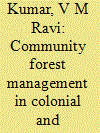

|
|
|
|
|
| Publication |
2012.
|
| Summary/Abstract |
In the past two decades, South Asia has undergone robust reforms in the forestry sector which claim to be initiating a transformation from state-centric to people-centric forest management. This shift is perceived as an important move towards decolonisation in governance processes in India. Examining the forest policies in colonial and postcolonial South India, this article finds, however, that community forest management in postcolonial India remains substantially rooted in the colonial framework of forest resource management policies. In practice, this means that exploitation of forests gives some consideration to the requirements of forest-dependent communities today, but does so now under the control of a state that fails to protect the most basic rights of many of its most vulnerable citizens. The article thus argues critically that supposedly people-centric community forest management in India is not sensitive enough to local development needs, nor indeed sufficiently protective of the basic needs of many forest-dependent people.
|
|
|
|
|
|
|
|
|
|
|
|
|
|
|
|
| 2 |
ID:
140457
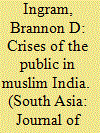

|
|
|
|
|
| Summary/Abstract |
This article argues that Sayyid Ahmad Khan (1817–98) and Ashraf ‘Ali Thanvi (1863–1943) were, respectively, exemplars of what I will call the liberal critique of custom on the one hand, and the Islamic legal critique of custom on the other. I argue that a range of overlapping semantic fields in their Urdu works—‘custom’ (rasm), ‘reform’ (islah), ‘decline’ (zawal, tanazzul) and ‘nation’ or ‘moral community’ (qawm), among others—opens up new lines of inquiry in comparing Aligarh and Deoband, typically treated as incommensurable in their views, as institutions and movements. I suggest, additionally, that ‘the public’ (‘amm) was a shared frame through which they envisioned implementing their respective projects. At the imagined centre of these publics, they located a new sort of Muslim: literate, self-regulating, self-fashioning, guided by rationality (‘aql) and free, above all, of the moral and social entanglements of ‘custom’.
|
|
|
|
|
|
|
|
|
|
|
|
|
|
|
|
| 3 |
ID:
102683
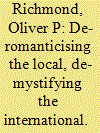

|
|
|
|
|
| Publication |
2011.
|
| Summary/Abstract |
Many actors involved in peacebuilding and statebuilding are acutely aware of the different roles of the 'local' in peacebuilding. Increasingly, this realisation has opened up tensions between the liberal peace and the realm of customary forms of politics and social structure. Peacebuilding may now be seen as a site of international assistance and local acquiescence, co-option or resistance. To understand these dynamics, the 'infrapolitics of peacebuilding' need to be uncovered. This article presents these dynamics in the cases of Timor Leste and the Solomon islands.
|
|
|
|
|
|
|
|
|
|
|
|
|
|
|
|
| 4 |
ID:
128529
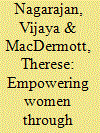

|
|
|
|
|
| Publication |
2013.
|
| Summary/Abstract |
Although the pluralist system of land tenure in Vanuatu does not directly discriminate against women, the operation of the system and contemporary interpretations of custom is increasingly marginalising women from the decision making processes regarding land management and control. Commitment to the principles of gender equality through constitutional guarantees and the ratification of relevant international treaty obligations, while providing a relevant legal framework for equality, have only had limited success in addressing discriminatory practices. This article analyses alternative ways to overcome the barriers faced by women that are currently under consideration in many Pacific island Countries, including recording and registration, as well as legal vehicles such as incorporating customary land groups, trusts and community companies. This article concludes that while both existing and proposed mechanisms have the potential to secure for women a greater role in decision making processes regarding land management and control, that potential will not be realised in the absence of knowledge, empowerment and the acceptance of the legitimacy of such rights
|
|
|
|
|
|
|
|
|
|
|
|
|
|
|
|
| 5 |
ID:
185578
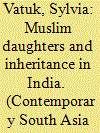

|
|
|
|
|
| Summary/Abstract |
Islamic law gives women shares in the estate of a deceased parent, husband, and certain other relatives. However, in India they rarely obtain the inheritance shares to which they are entitled. When the time comes, they typically either waive their inheritance rights or are prevented by their male co-heirs from accessing them. Those who assert a claim to their shares find themselves vilified by their natal kin and by society at large, as greedy, grasping, selfish, unwomanly and lacking in family feeling. They are often even ostracized by their brothers, sisters-in-law, and other family members. Drawing upon data from interviews conducted in Delhi in 2011, I explore this gap in India between Islamic law and actual practice, with specific reference to a Muslim daughter’s right to inherit natal property.
|
|
|
|
|
|
|
|
|
|
|
|
|
|
|
|
| 6 |
ID:
095555
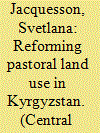

|
|
|
|
|
| Publication |
2010.
|
| Summary/Abstract |
The question of pastoral land use in colonial Central Asia is set against the goals and assumptions of present-day laws and regulations in Kyrgyzstan. In order to highlight the main choices of the colonial administration and their consequences on the local level the analysis is focused on three dyads: territorial divisions versus clan divisions, ownership versus administration and administration versus self-government. By pointing out that the colonial reforms on nomads were mainly driven by the phantoms of 'clans' and 'custom', this article argues that certain misconceptions of nomadism are characteristic of any modernization programmes, be they those of colonial Russia or those that are currently being implemented. In Kyrgyzstan the recently introduced 'grazing committees' as the main actors in the management and control of pastures perpetuate the myths of self-government and tradition among nomads. In conclusion the article advances the thesis that the reliance on 'custom' and 'tradition' and the dismissal of real social relations of pastoral land use are among the most important reasons for the failure of pastoral land reforms in the past and in the present.
|
|
|
|
|
|
|
|
|
|
|
|
|
|
|
|
| 7 |
ID:
094110
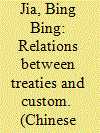

|
|
|
|
|
| Publication |
2010.
|
| Summary/Abstract |
The interplay between treaty and custom is a topic of great importance in practice and theory. An attempt at unravelling the intrigues involved in this interplay requires an understanding of the formal nature of the two sources of treaty and custom, and of the impact they exert upon each other in the search for applicable law in a concrete situation by government officials, judges and legislators. The separateness of these two sources is at times blurred, but shall always be maintained. Rules derived from both sources contribute to the body of international law, and they are rules of equal force. The rules thus derived may restrict each other in application and conflict in content, thus being conducive to incongruity in law, and may become asymmetrically opposed, as practice often outpaces or ignores treaty in response to evolving realities.
|
|
|
|
|
|
|
|
|
|
|
|
|
|
|
|
|
|
|
|
|